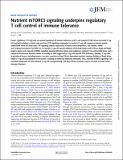Nutrient mTORC1 signaling underpins regulatory T cell control of immune tolerance
Author(s)
Efeyan, Alejo; Sabatini, David M.
DownloadPublished version (2.498Mb)
Publisher with Creative Commons License
Publisher with Creative Commons License
Creative Commons Attribution
Terms of use
Metadata
Show full item recordAbstract
Foxp3+ regulatory T (T reg) cells are pivotal regulators of immune tolerance, with T cell receptor (TCR)-driven activated T reg (aT reg) cells playing a central role; yet how TCR signaling propagates to control aT reg cell responses remains poorly understood. Here we show that TCR signaling induces expression of amino acid transporters, and renders amino acid-induced activation of mTORC1 in aT reg cells. T reg cell-specific ablation of the Rag family small GTPases RagA and RagB impairs amino acid-induced mTORC1 signaling, causing defective amino acid anabolism, reduced T reg cell proliferation, and a rampant autoimmune disorder similar in severity to that triggered by T reg cell-specific TCR deficiency. Notably, T reg cells in peripheral tissues, including tumors, are more sensitive to Rag GTPase-dependent nutrient sensing. Ablation of RagA alone impairs T reg cell accumulation in the tumor, resulting in enhanced antitumor immunity. Thus, nutrient mTORC1 signaling is an essential component of TCR-initiated T reg cell reprogramming, and Rag GTPase activities may be titrated to break tumor immune tolerance.
Date issued
2019-10-24Department
Whitehead Institute for Biomedical Research; Koch Institute for Integrative Cancer Research at MITJournal
Journal of experimental medicine
Publisher
Rockefeller University Press
Citation
Do, Mytrang H. et al. "Nutrient mTORC1 signaling underpins regulatory T cell control of immune tolerance." Journal of experimental medicine 217 (2019): e20190848 © 2019 The Author(s)
Version: Final published version
ISSN
0022-1007
1540-9538
Keywords
Immunology, Immunology and Allergy